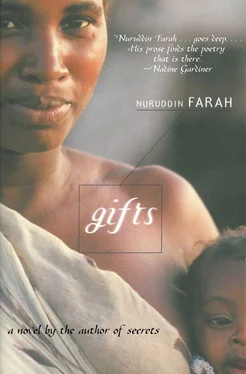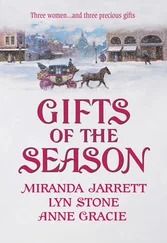Nuruddin Farah - Gifts
Здесь есть возможность читать онлайн «Nuruddin Farah - Gifts» весь текст электронной книги совершенно бесплатно (целиком полную версию без сокращений). В некоторых случаях можно слушать аудио, скачать через торрент в формате fb2 и присутствует краткое содержание. Год выпуска: 2011, Издательство: Arcade Publishing, Жанр: Современная проза, на английском языке. Описание произведения, (предисловие) а так же отзывы посетителей доступны на портале библиотеки ЛибКат.
- Название:Gifts
- Автор:
- Издательство:Arcade Publishing
- Жанр:
- Год:2011
- ISBN:нет данных
- Рейтинг книги:3 / 5. Голосов: 1
-
Избранное:Добавить в избранное
- Отзывы:
-
Ваша оценка:
- 60
- 1
- 2
- 3
- 4
- 5
Gifts: краткое содержание, описание и аннотация
Предлагаем к чтению аннотацию, описание, краткое содержание или предисловие (зависит от того, что написал сам автор книги «Gifts»). Если вы не нашли необходимую информацию о книге — напишите в комментариях, мы постараемся отыскать её.
Gifts — читать онлайн бесплатно полную книгу (весь текст) целиком
Ниже представлен текст книги, разбитый по страницам. Система сохранения места последней прочитанной страницы, позволяет с удобством читать онлайн бесплатно книгу «Gifts», без необходимости каждый раз заново искать на чём Вы остановились. Поставьте закладку, и сможете в любой момент перейти на страницу, на которой закончили чтение.
Интервал:
Закладка:
When they were in the kitchen, Duniya said, “Bosaaso isn’t here. So what can I offer you? Tea? Coffee?”
Kaahin said, “We met him in town, running errands. It was he who told us you were here. In fact, I was taking Hibo to your place.” He wore a charming smile.
Duniya decided not to mention that Waaberi had come to see Bosaaso on her own and had not received a warm welcome.
“What’s the matter with you? You look like a suttee who’s come to take her leave of the world she loves,” she said to Hibo, sitting in her chair wrapped in rags of sadness.
Hibo didn’t ask who or what a suttee was, but Kaahin did.
Duniya remembered the explanation Nasiiba had given her, which she repeated, looking not at Kaahin whose question she was answering, but at Hibo who chose to remain silent. “Suttee is a Hindu custom in which a widow immolates herself on her husband’s pyre.”
This made Kaahin so unbearably nervous that he got up as if his chair had instantly turned into an electric one. He said, “I really must go, to let the two of you talk. Thank you, Duniya. Good luck, Hibo,” and dashed out of the kitchen door, banging into it. Even this didn’t stop him. For he shook his head in amazement, grinned and went out as fast as his legs would take him. Soon after, all noises ceased. “What’s ailing you?” Duniya asked Hibo.
Emotionless, Hibo said, “I think I’ve killed Gallayr, my husband.”
“You think you’ve killed him?”
“Yes,” said Hibo, her voice empty of sadness.
“Where’s his body?”
“At home.”
Duniya remembered the detective novels she had read and said, “Is he buried under a pile of earth with bushes hiding the mound or is his corpse in the freezer, awaiting a mortician’s arrival, soon to be followed by an inspector with an unlit pipe?”
Hibo didn’t appreciate Duniya’s humour. She said flatly, “When I left him he was on our bed, grovelling with pain, his face pale and swollen, his eyes bloodshot and all the veins visible.”
“Where did you hide the knife?” asked Duniya.
“I didn’t use a knife.”
“And where are your children?”
“They spent the night at a relative’s.”
Duniya drew comfort from the news that she wasn’t the only one who had spent the night out of her usual bed. For all anyone knew, Hibo had spent it in Kaahin’s place, and was carrying her make-up kit in her handbag that she clutched so tightly during her visit.
“So this was premeditated murder, cold and calculated?” said Duniya.
Not a muscle of Hibo’s moved. “Yes,” she said.
“Where did you throw the gun? Or was this what you and Kaahin were arguing about in whispers by the entrance?” Duniya asked.
“I didn’t use a gun.”
“If you didn’t a knife or a gun, what did you use — poison?”
Hibo nodded, and for the first time since they started talking about all this, she winced. But she suppressed her tears. Her husband, Gallayr, had done something for which he had to be punished, and she did just that. There was no need to shed a tear.
“Don’t you want me to tell you why?” asked Hibo.
“He’s given you gonorrhoea and you killed him by poisoning his food,” Duniya said. Hibo had said that she would either kill or commit suicide if her husband gave her gonorrhoea; she had said so on the day an out-patient confessed her own husband had given her the disease. It was a bore to be as predictable as Hibo, Duniya decided.
Hibo then burst into a tiresome explosion of tears and emotions, but there was something shallow, something pretentious, about her weeping. Given a few seconds, Duniya was certain all this crying would peter out like a river ending in a desert.
Hibo was quiet now and asking Duniya, “What would you do if you were in my place?”
Duniya found it difficult to imagine standing in Hibo’s shoes, but she was a very bright woman and so she said, “If I were you, Hibo, I would go home, and give myself a single effective injection of 2.4 or 4.8 mega units of procaine penicillin.”
“And what would you do about him?”
Duniya said to herself that when husbands are reduced to “him” and wives to “her,” then it is high time the marriage is dissolved, or an illicit affair considered. Being a woman of northerly honour and from Burco where such women are still raised, Hibo contemplated murder. Duniya said, “It depends if he is dead or still alive and breathing.”
“What do you mean?”
Hibo was formidably calm for someone who had poisoned her husband’s food, and Duniya wondered if it was some kind of joke? But she said, “If he is dead, then you must live with your secret for the rest of your days, telling no one what you’ve done.”
“Or perform a suttee, is that what you said that Hindu custom is called?”
Duniya marvelled at her own calm; marvelled at the fact that she was behaving as though she knocked off a husband every April Fool’s Day, as though it were an annual affair for her. It was so incredible she wished Nasiiba were here, probably the one person who might appreciate such macabre anecdotes.
“Performing suttee is too neat. People here in Somalia have not that subtle an understanding of your kind of motive or death, and we wouldn’t wish to waste it on them.”
Hibo pleaded. “What do I do if he isn’t dead?”
“Take him to the hospital and let the doctors decide what chemical antidotes he should be given by telling them what you’ve put in his food,” Duniya advised.
“The man deserves to be dead,” Hibo said.
“So why ask my opinion if you are already decided?”
“I am his very respectable wife, not some street woman,” Hibo said, “to whom he may give gonorrhoea and get away unpunished.”
“Let’s not get carried away. Forget about all this rhetoric of northern honour and southern dishonour. Gallayr has infected you with poison and by putting poison in his food, you’ve poisoned him too.” Duniya helped Hibo to her feet. “There’s no time to waste. Go home and take him to the hospital.”
She then escorted her to the gate. There were tears in Hibo’s voice as she said, “You’re a very strong woman and I envy you.”
Then Hibo’s tongue, thick as a slice of gorgonzola, lay inert in her mouth. Duniya wished her good luck, and they hugged.
Outside they saw Kaahin’s car, parked just outside the gate, and Bosaaso was there talking to him. A little later, Duniya and Bosaaso left in great haste for Duniya’s place.
The children’s chatter stopped when Bosaaso and Duniya walked in. When the ability to speak or to pick up a broom or mop returned, the youngsters went back to work Bosaaso was treated uniformly by all three as though he were an elder brother. Marilyn and Fariida were there as well, but they were too formal with him for his liking.
Duniya and Bosaaso were offered chairs and asked to relax, as though they had come from a long, physically exhausting journey.
Nasiiba came to report that the city flat had been prepared, or at least Uncle Abshir’s room had been readied for use tonight. “And we’re getting a bouquet of flowers,” she added.
Duniya sat up. “A what?”
“A bouquet of flowers and the whole works.”
“Whose idea is this?” Bosaaso said.
“I’ll dress in white, Duniya, gloves and all,” Yarey volunteered.
“But whose idea has this been?”
“Mine,” said Nasiiba.
“We’re welcoming him as though he were a visiting head of state,” Yarey continued, repeating something Nasiiba had told her. “You know, like when a head of another country visits Somalia, a young girl is dressed in white and she gives him a bouquet of flowers. We see that on TV a lot.”
Читать дальшеИнтервал:
Закладка:
Похожие книги на «Gifts»
Представляем Вашему вниманию похожие книги на «Gifts» списком для выбора. Мы отобрали схожую по названию и смыслу литературу в надежде предоставить читателям больше вариантов отыскать новые, интересные, ещё непрочитанные произведения.
Обсуждение, отзывы о книге «Gifts» и просто собственные мнения читателей. Оставьте ваши комментарии, напишите, что Вы думаете о произведении, его смысле или главных героях. Укажите что конкретно понравилось, а что нет, и почему Вы так считаете.











